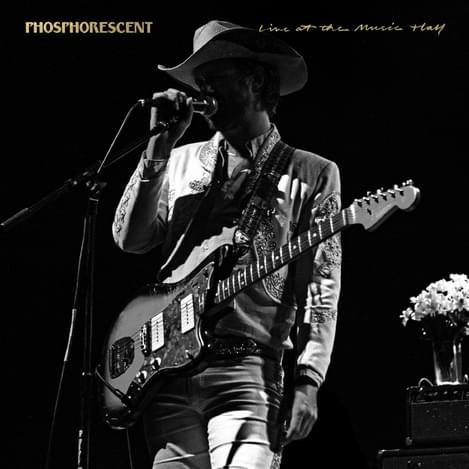Phosphorescent - Live At The Music Hall
"Live At The Music Hall"

Wrong. Gaze back to the supposed golden era of rock and you'll encounter many gate-sleeved live opuses that capture their legendary, born-to-play-live subjects at the peak of their powers and in their element. Considering the level of inspiration Matthew Houck (the Alabama-born but Brooklyn-based songwriter at the center of Phosphorescent) has drawn from the titans responsible for, say, Live Rust (Neil Young & Crazy Horse, 1979), Rock of Ages (The Band, 1972) or Bob Dylan’s underappreciated warts-and-all angst-fest Hard Rain (1976), it's only fitting his loose collective has now joined the lineage of double live albums upheld in fine style by Wilco (Kicking Television, 2006) and My Morning Jacket (Okonokos, 2007) in more recent years.
As with its vintage forebears, Live at the Music Hall is not pitched as a greatest hits package. Rather, it's intended as a portrait of where and what this incarnation of Phosphorescent were when these 19 tracks were recorded at Brooklyn's Music Hall at the tail end of 2013. But as anyone who's seen Houck live either solo or with a band can probably guess, an extended trawl through Phosphorescent's four albums of original material from 2005's Aw Come, Aw Wry onwards will inevitably work as an ideal introduction to the band.
Recorded after 8 months of touring in support of the excellent Muchacho, the run of cuts from that 2013 album that kicks off the set provides the most revelatory reworkings here. Adding the organic expansiveness - pedal steel and organ to the fore - of the well-drilled five-piece band to the slow-burning, subtly electronic shimmer of the originals, the mainly melancholy material becomes gratifyingly, unexpectedly uplifting; the Saturday night before Muchacho's Sunday morning, perhaps. For evidence, check out the steady galloping groove of “Terror in the Canyons (The Wounded Master)” and a heavy-lidded “Down to Go” that tops up the weariness of the studio cut yet wounds up sounding strangely celebratory anyway, like a tears in my beer anthem with that's enjoying the company too much to bother with weeping.
A classic example of a singer who's perhaps not a conventionally great vocalist but knows just what to do with the tools he's been given, Houck is on superb form throughout. The sublime string-enhanced, throbbing take on “Song for Zula” is particularly powerful, with Houck squeezing huge amounts of emotion from subtle shifts of tone and phrasing, much like his hero Willie Nelson (sadly, there's not a drop of 2009's tribute To Willie here), resulting in a distinctly contemporary take on the Cosmic American Music Houck's been chasing for the last 10 years.
Elsewhere, the quest for authenticity, the drive to present a realistic, uncut portrayal of what actually went on during these shows, doesn't work quite as faultlessly in home listening. The epic 10-minute take on “Los Angeles” (off 2010's Here's To Taking It Easy) works beautifully as long as the focus is on the actual song, but it's hard to believe they couldn't locate a more compelling jam than the meandering slouch of the noodle-loving middle section amongst the three full band nights.
As inspired as the band's sounding, it's the three cuts from Houck's solo show that really stun. An extended rendition of “Wolves” (off 2007's Pride), which culminates in a chorus of multiple Houcks (thanks to some tech wizardy involving delay pedals) howling and growling at each other or maybe at the full moon, is particularly spine-tingling, a brilliantly expanded, haunting and haunted rendition which proves that Houck needs few added ingredients to wow a hallful of folks and is such exactly the type of musician who deserves to have his performance abilities captured for posterity.
Get the Best Fit take on the week in music direct to your inbox every Friday

Tunde Adebimpe
Thee Black Boltz

Julien Baker & TORRES
Send A Prayer My Way

Bon Iver
SABLE, fABLE





